#tindomiel
Text


Reunion
Elrond visit the family of Elros in palace of Numenor
(buildings and clothing refer to the web)
1K notes
·
View notes
Text
Hold His Own | on ao3.
Elros and his family, for @nolofinweanweek.
Elros left his children the tools and the means to commit all the mistakes of his forefathers, and new ones besides; and he was not sorry for it in the slightest.
(All of them come to him in the dark once at least, crying and seasick, wanting to be held and sang to quietness. There was a wave, little Vardamir said it first; and his children after him, too, weeping and afraid as he had vowed they never would be. A wave, and it was angry, and it came for everything).
In his old age, Tar-Minyatur looked little older than his grandson's children. Silver was in his hair, and the silver of his eyes a little dulled; but his mind was sharp still, and eager. He walked the quays every day, and bent his back on harvesting seasons.
Only his son's growing weakness kept him from venturing out on the fishing vessels that scoured Ulmo's realm for fat tunas and rich whales - and all his children and their children were raised more on tales of the first eventful seal-hunting expeditions up and down the shores of Númenor than on tales of Beleriand.
Sirion, Doriath, Gondolin and Hithlum - those came later, when they learned their letters and their histories. His brother, in love with lore and the keeping of lore, would argue against it, and no doubt rear his children in the wisdom of Melian's line and the solemnity of eternal memory.
Elros was mortal. He raised his people to love themselves first of all, their cities and language and ways. They sang new songs every season, composed new and useless rhythms with dizzying speed - and the king of Elenna, who had grown among enemies, and made war on Melkor, delighted above all things in this speedy work, the restless pettiness of every day's effort.
The work of one's hands was rarely more beautiful than when it was raised up to protect against wind, hail and spray - than when towers were raised on strong foundations, and around them cities raised on beautiful lines.
He wrote his deeds and thoughts in treatises and decrees, the lore made to be read by lore masters in centuries to come. It was important to keep the past alive, and prepare for the future, study portents and ignore not foresight - Yet not, Elros wrote in the letters he tossed at the waves, Mithlond-bound, at the expense of this year's seaweed nurseries.
Vardamir was hungry enough to learn, and Tindómiel cared mostly for the business of the ships and the studies of the stars - Atanalcar went pearl-diving most of the summer, every summer of his life, and Manwendil liked riding best of all, and was a friend to the sea-birds that brought him small tokens of sea-glass and feathers.
Elros left his children the tools and the means to commit all the mistakes of his forefathers, and new ones besides; and he was not sorry for it in the slightest.
(All of them come to him in the dark once at least, crying and seasick, wanting to be held and sang to quietness. There was a wave, little Vardamir said it first; and his children after him, too, weeping and afraid as he had vowed they never would be. A wave, and it was angry, and it came for everything).
He soothes them all. Lullabies, half-forgotten and half-improvised, sweet with Menegroth's lilting rhymes; a few tries at the harp, and their little heads rested trustingly on his shoulder, asleep without fear again.
Dreams were only dreams, in the morning. None of them saw bloodshed before their coming of age; none of them would shed blood unjustly, for greed.
Tar-Minyatur knew this, because they were his children. He knew also that their children were like to have children themselves, and for all the friendship of the sea, an island was only so large and plentiful as the number of its people allowed them to be.
The gulls brought gifts to him, too. Perhaps they would do so to his descendants, too, five or ten births down the line, if not twenty. Did birds lose the keenness of their memory, as old men did?
The king's windows were always open, to the fresh star-lit light of the evening, when the weather allowed. In his last years, his bones turned into tyrants even on warm nights, but Tar-Minyatur found time to evade his minders, to bring out his bowl of seaweed and dumplings to the parapets of his towers and speak to Gil-Estel all the same.
All the old people of the island did, when they were soon to die. That last bearing of witness, some of the Edain held, was what stars were for, and this one most of all.
They may choose to tear them down in time, and build them anew, wrote Tar-Minyatur, silver-haired and trembling with the cold of an open window, young still in a way his brother would never be again.
He had taken to reading old philosophical texts with his son's grandchildren, now that they were old enough to be interested in these things, to know death and be a little angry at it, and petulant about the old king's way of teasing them. They went off to complain to Vardamir, who explained everything a little better, a little more sensibly.
No one had called him Elros in many years. All the same, the king wrote: Let them be as they would! That will be their choice! But they shall choose, and choose to look onwards, not back into the unalterable past. The best gift I can give them is to give them some stone and soil to stand upon, and the will to go onwards as they would, with the years they have to live.
Tar-Minyatur raised his children to know this. Great and terrible things came of that, and he foresaw many, if not most; but then, one must think of this day's effort most of all. The future would come, as certain as the tides and the summer storms. It was enough to leave behind strong foundations, and something of estel to pass onwards. All wise old men in Elenna knew this, and held it to be true.
#elros#elrond#vardamir#tindomiel#silm fic#nolofinweanweek#nolofinwëans#the fall of numenor#my fics#tolkien fanfiction
48 notes
·
View notes
Text
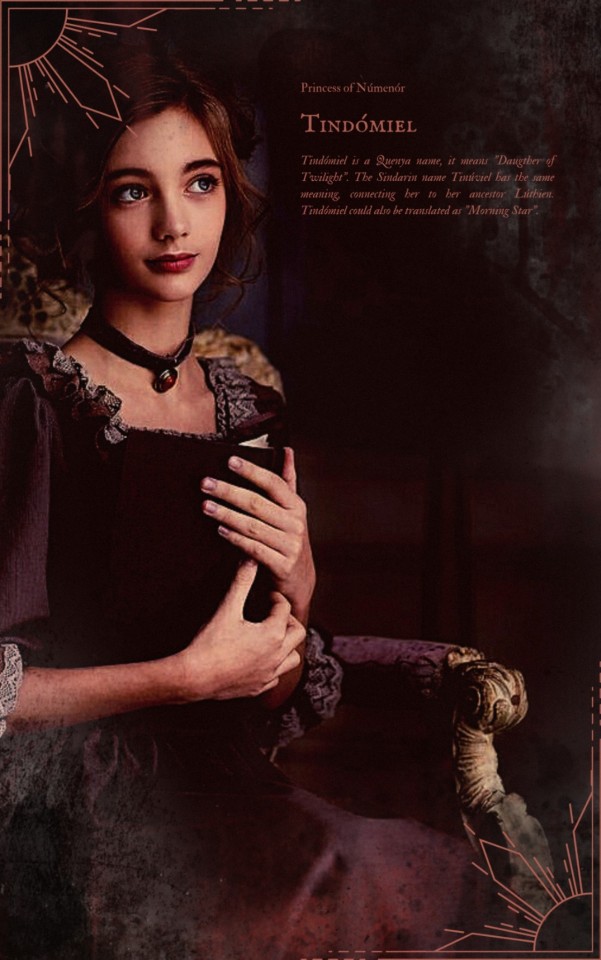


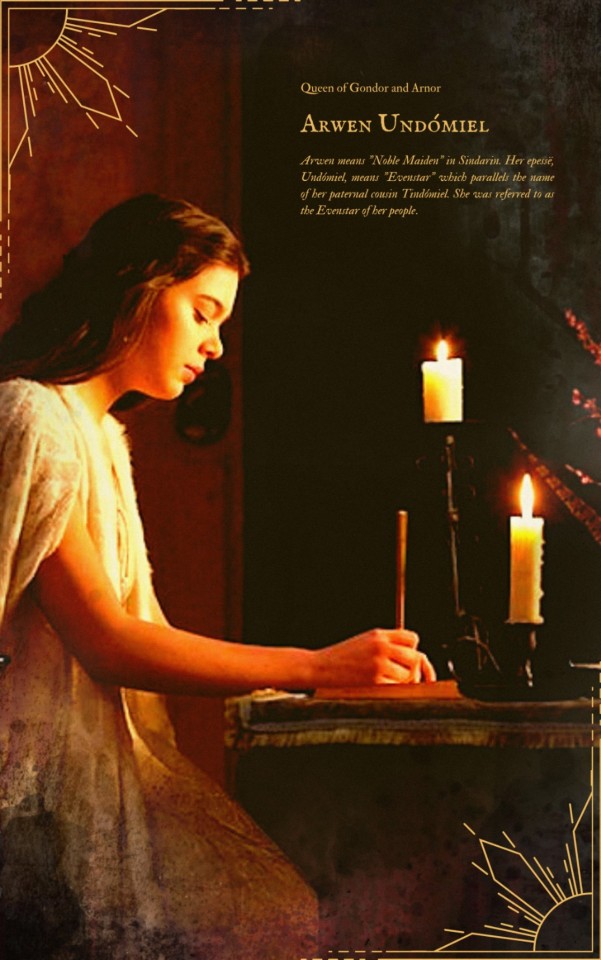
Tindómiel and Undómiel
@finweanladiesweek day iv - later generations
#finweanladiesweek#tuserosie#userlyndeth#tindomiel#arwen#arwen undómiel#peredhel#tolkien ladies#tolkien elves#silm#silmarillion#lotr#the lord of the rings#lotredit#silmedit#my edit#✨ mine#tolkienedit#tolkien
125 notes
·
View notes
Text






Now spread each wing, for the eastern sky
With sunlight soon shall glow.
The morning star shall light us home.
— Louisa May Alcott, "Fairy Song"
4 notes
·
View notes
Note
do you have any tar-miriel headcanons? [or tindomiel headcanons?]
When Elros tells stories to his children, his sons beg for tales of Fingolfin's glorious charge unto Angband, for Earendil's desperate foray into mist and salvation, for Tuor's raging defence of wife and son atop Gondolin's battlements. His daughter does not contradict them, nor does she fuss to hear it: her eyes glow just as bright as Vardamir, just as fervent.
But when she asks for tales, she asks to hear of Idril's great secret tunnel, hidden even from her beloved father. Of Lalwen's defiance, blazing in the salt-flats of Sirion, of Findis' steadfast piety and of Findis' grandmother, passed long before Elros' foster-father could have ever told him tales, passed long before the first elves ever reached Aman: Intyale the Bright-Speared, who snuck into Morgoth's lair before ever he established himself in Angband, who stole away her sister with nothing but clenched fists and a knife-sharp spear.
Perhaps that should have been Elros' first warning.
...
(The second warning came when she chose a craft, in the fashion of the Noldor.
Vardamir had not chosen a craft--not officially, at least, for all that he barely ever threw off the scholar robes Elros and Eresse had gifted him--but Tindomiel made a song and dance of it, insisted, until Elros gave in out of exasperation.
Tindomiel chose prayer.
A safe choice, people seemed to feel, and relaxed. Grandeur in the name of the Valar? She is following the footsteps of her mother.
But that was not the warning. The warning, Elros did not realize, had been in the song and in the dance and in the blazing soaring masquerade of it all.)
...
Tindomiel is the quiet one of his children: quiet and calm, never quite so fierce as Manwendil or as cheerful as Atanalcar or as quick to speak as Vardamir, for all that she is most similar to him. Both she and Vardamir are reserved, in fact; so much that Elros and Eresse had found themselves struggling with Manwendil’s blazing spirit as a youth, so heavily contrasted against his elder siblings.
...
Three thousand and thirty-two years in the future, a boy finds an embossed book tucked behind the dark shelves of Numenor’s library. He does not spend much time in the library--he finds joy in the open fields of war, feet rooted on the rolling deck of a seafaring boat--but his tutors have impressed upon him the need to understand history for military ventures.
He is fourteen years old. He is a curious fourteen years of age.
The book--long abandoned--opens before him like sunlight. The first sentence alone takes him a week to decipher from the chicken-scratch and the old script, but nobody has ever called him unmotivated.
I am the daughter of kings and gods, he reads. I know my inheritance.
And below it, in the glorious swooping signature of the first and highest princess of Numenor: Tindomiel Anyale Alfirinie.
...
Tindomiel inherits nothing. Vardamir has a kingdom; Manwendil his position in Numenor’s army; Atanalcar his beaches and fertile coastlands from their mother. Tindomiel, alone, has nothing.
(She asks for nothing.)
(She refuses what is given, and takes nothing as well.)
There is no room for land or titles or positions where Tindomiel wishes to go.
...
She spends many decades in the temples. They are beautiful places, made of song and light; and there are dozens of them, made precisely to be a home to those that wish to worship in one manner or another. Tindomiel wanders through them--she spends no more than a month in each.
One week to establish herself. Two weeks to learn their philosophy. One last week to practice that philosophy.
And leave, and repeat.
She takes them all in to herself, swallows the meditation and the approach and the practices. Bares herself, soul and more, before the stinging scouring gazes. Swallows the bitter draughts; swims in the strong incense. Kneels on the cold stone. Sings in the drenching monsoons. Wanders the darkness, accepts the lashes, follows the fasts.
Finds what works for her.
And gets to work.
...
There is an old story that Luthien was told by her mother, amid the star-shining eaves of Beleriand-unmarred.
An elf-maid falls in love with her sister’s lover, and wishes to die of the agony: so she reaches with all her fea for what can never be, and in her straining gasping throes she shatters the walls of the world, and is never seen again.
A warrior of the Ainur known for the depth of his loyalty and the swiftness of his blade is forced to choose between saving his oathsworn company or holding to his vows to his lord and god: so he reaches with all his fea to escape what he cannot leave, and in his straining gasping throes he shatters the walls of the world, and is never seen again.
An abandoned child of slaughtered parents wails and wails and wails for comfort that will never come: and so she reaches with all of her fea for warmth that she remembers so well, and in her straining gasping throes she shatters the walls of the world, and is never seen again.
A swooping hand, wrapping around a little girl’s dark (night-dark, nightingale-dark) hair--and Melian’s voice, soothing even in a horror story: This is what happens when the world is too cold and too cruel. The impossible becomes possible, in situations of impossible brutality.
When pushed too hard, little one, people break the world. We can offer them so little after they have surrendered to that fate: we can only remember. And in remembering, we respect them. We cherish them. We honor them, and we name them gods.
...
(Who do the Valar worship?)
...
None of Melian’s stories mention humans. No human has ever broken the walls of the world. No human, none of the thralls of Angband, none of the captives of Sauron, none of the warriors of the War of Wrath--none of them have ever become a god.
But Tindomiel is the daughter of queens and kings: dragonslayers and lightbringers. Her ancestry is as grand as ever her father and brothers. And she has been raised on stories of wolves and dying, desperate defiance and women, forgotten, abandoned, lost.
Idril, who sailed to the west and was never seen again. Finduilas, pinned to a tree, screaming until her lungs would not draw more breath. Her own mother, who sailed west to Numenor with her bare hands. Nimloth, dead with two Feanorians’ blood on her sword and her lance held tight in her hands. Luthien, who danced at the death and won life for herself and her lover. Melian, who held fast before Morgoth himself--who Morgoth dared not challenge upon her own lands. Lalwen, disappeared after the Third Kinslaying. Findis, silent by choice and chance. Indis, quiet and hidden in the cold golden halls of her uncle’s city. Intyale, defiant and triumphant even at the end.
And Elwing, who fell rather than surrender, and flew rather than die.
Elwing. Who was human and Maia and elf. Who loved life so well she won immortality right out of Namo’s stingy fingers.
...
Elwing is her grandmother, and Tindomiel’s dreams are as grand as any king’s.
...
The boy asks what his tutors know of Tar-Minyatur’s eldest daughter, and hears--quiet girl, dutiful child; no children; pious and dedicated; unwedded; wedded to her craft; dead of unknown causes in S.A. 442--and tries to reconcile the description with the brash, prideful woman of the journal.
Then he remembers that Elros Tar-Minyatur died in 442 as well, and a chill goes down his spine.
...
First, she gives up food. Then she gives up water. Then she measures her very air: not too deep, not too much.
A human’s body is not so durable as an elf’s, but it is durable enough for this.
...
Near enough to see, Tindomiel has written, on the last filled page of the journal. Near enough to see, but never touch. Near enough to hope but never reach. Well: I shall reach higher than any of them!
The boy touches the words with the tips of his fingers. Swallows.
There is no more to this story here, but he has--a feeling. A knowledge inside him. A seed, steadily growing into a wide-branched oak. And he is old enough, now, to take the horse and ride to Romenna without anyone’s permission.
At the bay, he wanders the seaside. It has been more than three thousand years. Surely--surely the coast would have--changed--
But then he sees the curve of the beach, shallow and cut of ragged stone, echoing the same sketch that Tindomiel had made in the journal, and excitement flares in his belly. The boy approaches. Strips off his boots and cuffs his trousers, ignores the way the stones cut into his feet and the salt of the sea stings the wounds.
Stands there, balanced, on two flat stones. Then he lifts his hands to the sun, and folds the sole of his foot against the inside of his thigh: trusting in the sea to support him.
Tindomiel had studied for centuries to find what worked for her. He does not have those same centuries, but he is not trying to break the walls of the world: he is only trying to see into the past. And for that, all he needs is--
“Anyale Alfirinie,” he calls out, into the spiraling light of earliest morning.
Tindomiel, named for the morning star, called forth on the eastern beach of Numenor, with the epesse of her choosing.
The dawnlight spills around him like liquid gold.
And with the light comes Tindomiel.
...
“Tindomiel!” bellows a voice.
Startled, she jerks out of her reverie. Even that is smooth at this point: there is little energy left in her limbs for such petty things as surprise or shock. When Tindomiel looks over her shoulder, her father stands on the beach, and beside him is Vardamir.
“Father,” she says. Her voice rings of bells and samite: lent some eldritch strength from her prayer. “Why are you here?”
“To stop you from killing yourself,” he snarls, and steps into the water.
“You cannot stop me,” says Tindomiel. “Would you stop Vardamir from ruling? Atanalcar from governing? It runs in their blood as sure as the sun rises in the glorious east.”
“You mean to--”
“Yes.”
“It is not worth it,” he whispers. “Immortality is not yours to reach for.”
“It was yours,” says Tindomiel levelly. “But you chose otherwise.”
“And you hate me for it?”
“I have no room in me for hate,” she tells him. “Only the knowledge that I would have taken another path in your shoes. But I have only ever had one path, is that not true?”
“How can you say that?” he asks, wretched.
“Because I was not given anything but your blood,” Tindomiel says pityingly. “The only inheritance I have ever had was your blood. Elwing’s blood, and Luthien’s, and Intyale’s. And so with blood as my inheritance was my path written before me: to do the impossible, and to do it well.”
“You could have done anything,” says Vardamir. “But you chose to do this.”
“To be remembered,” she replies, “I would do much.”
“You will not be remembered for this,” says Vardamir. “Not ever. Do you understand? You will be erased. Everything that you have done--everything that you have achieved--it will be gone. This is too dangerous to keep alive. Even if you do this, Tinde--”
“--if you erase this,” she says, “you go against the oldest teachings of the Valar.”
“And if you continue this, you break Eru’s laws!”
“I have gone too far to choose otherwise,” says Tindomiel, and her eyes are glowing from the light of the dawn, gold and golder, and her hands rise, sweeping upwards like the blades of a knife slicing through the skin of the world, and the world splits apart with an indescribable noise. “Choose,” she says, and her voice is a glory of music now, so loud that Vardamir hunches over and Elros, sways, paling. “Your sister, your daughter--or your kingdom.”
The gold brightens until it blinds, and when it fades, there is nothing left: not Tindomiel, not Vardamir, not Elros. Just a boy, staring, starry-eyed, and silent.
...
Choose, Tindomiel had said, because she has laid out the contradictions of the Valar, because she has dedicated her life to this: for now her father must choose between following the Valar’s teachings to honor the daughter who has broken the walls of the world, and ignoring the Valar’s teachings to erase his daughter’s accomplishments and hide the dangerous implications of her accomplishments.
For Numenor is built on the knowledge that the Second-born cannot gain immortality. They can come close. They can come within sight of it.
But they cannot ever touch.
And now--
And now--
...
The boy steps out of the water, feet bleeding, and returns home. He imagines it. Tar-Minyatur, incapable of making that terrible choice, choosing death instead; Vardamir, making the choice but surrendering the scepter immediately after making it. Vardamir, who must have spent the rest of his life steadily expunging his sister from history.
Numenor is built on foundations of rot and ruin, he thinks, bitter as gall, stinging as salt on stone-slashed skin. Numenor is built on grief. And the desire to keep the kingdom alive even unto death.
His father replaces his tutors in a few weeks, so that his only son does not have to suffer from the delusions of elf-friends, and the boy is well-prepared for their rants against Tar-Minyatur, though his dislike is somewhat more... personal.
...
Forever after, there is something of golden sunlight upon him--wrapping his shoulders, chasing his footsteps. They all call him appropriately named, and he does not contradict them.
...
Decades and decades later, he boards Alcarondas and sits upon his throne, facing east: he looks towards the dark sky of the dawn, and he tells Tindomiel: I will touch what was untouchable, and though it could be his imagination, he swears a breeze flares over his skin like a warm touch.
This will be death, his generals all whisper, amongst themselves if they are too cowardly to tell him to his face. This will mean death!
“The Valar themselves shall worship us,” replies Ar-Pharazon, and bares his teeth, and resists the urge to touch his still-scarred feet. “Whether we are victorious or not, we shall achieve the impossible upon this journey!”
#silmarillion#tindomiel#ar pharazon#numenor#my writing#lmao okay so like. my anti-valar agenda continues.
106 notes
·
View notes
Text
The irony of Idril's first female descendant(Tindomiel) being named "Daughter of Twilight" and her behated cousin's mother name(Lomion) meaning "Son of Twilight"
40 notes
·
View notes
Photo
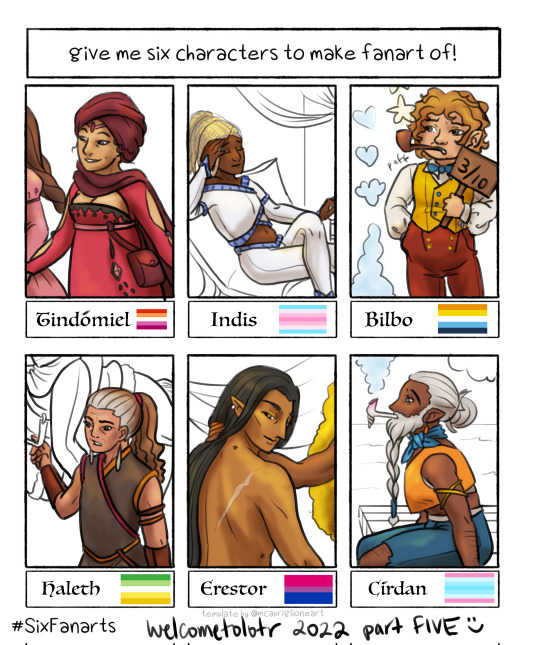
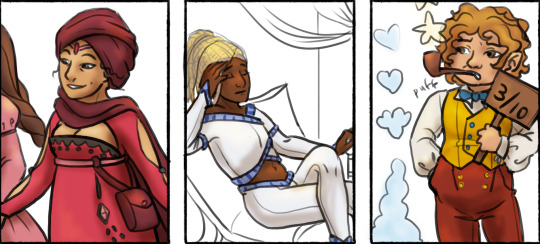
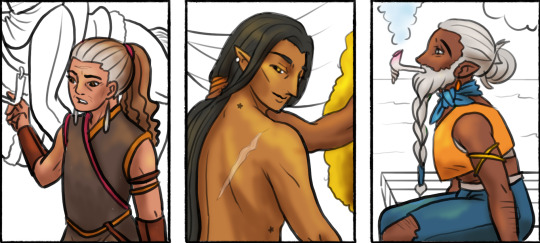
hehehuhu part FIVE!!! (four is in queue for aspec week, you’ll see it in May)
- Tindómiel (lesbian) and wife for @jaz-the-bard
- Indis (transfem) @paragosm
- Bilbo (aroace) for @8lottie8
- Haleth (alloaro) and Ryndil for @arofili
- Erestor (bi) and Glorfindel for me!! a reward :)
- Círdan (transmasc) - @nowendil
previous sets: one - two (trans) - three - four (aspec, not posted yet) - five
#tindomiel#indis#bilbo#haleth#erestor#cirdan#silmarillion#welcometolotr#the hobbit#six characters#i Want bilbo's little yellow waistcoat#also cirdan's whole aesthetic#bilbo is rating cirdan's smoke hearts if you're curious#the shire smoking contests are a harsh mistress
77 notes
·
View notes
Photo

Tindomiel
Morning Star they called you
The perfect daughter to herald in
A new age full of possibility
The star of the land
To go with the stars in your eyes.
Did you ever see your mirror image
The Evening Star
The lady who chose to taste
The bittersweet cup of mourning
And passed so quietly
In a decayed dream in the dark
Long ago in Cerin Amroth
But before she took those steps
Turning away from the grey mists
Of Valinor
Did you reach out to her, Tindomiel
Or did you hear her laugh
When you danced among the nightingales
Silk dress billowing in the eve
At the dawn of a golden age?
Morning Star. Evening Star.
Two daughters from different times.
21 notes
·
View notes
Video
youtube
Women of Middle Earth | Filles et femmes à la fois | Tolkien Fancast
women are born with pain built in
#silmarillion#the silmarillion#tolkien#lotr#eowyn#melian#luthien#arwen#andreth#haleth#nerdanel#arien#miriel#tar miriel#elenwe#aredhel#idril#finduilas#turin turambar#nienor#morwen#nimrodel#elwing#celebrian#elrond#galadriel#ancalime#erendis#dis#tindomiel
1 note
·
View note
Text
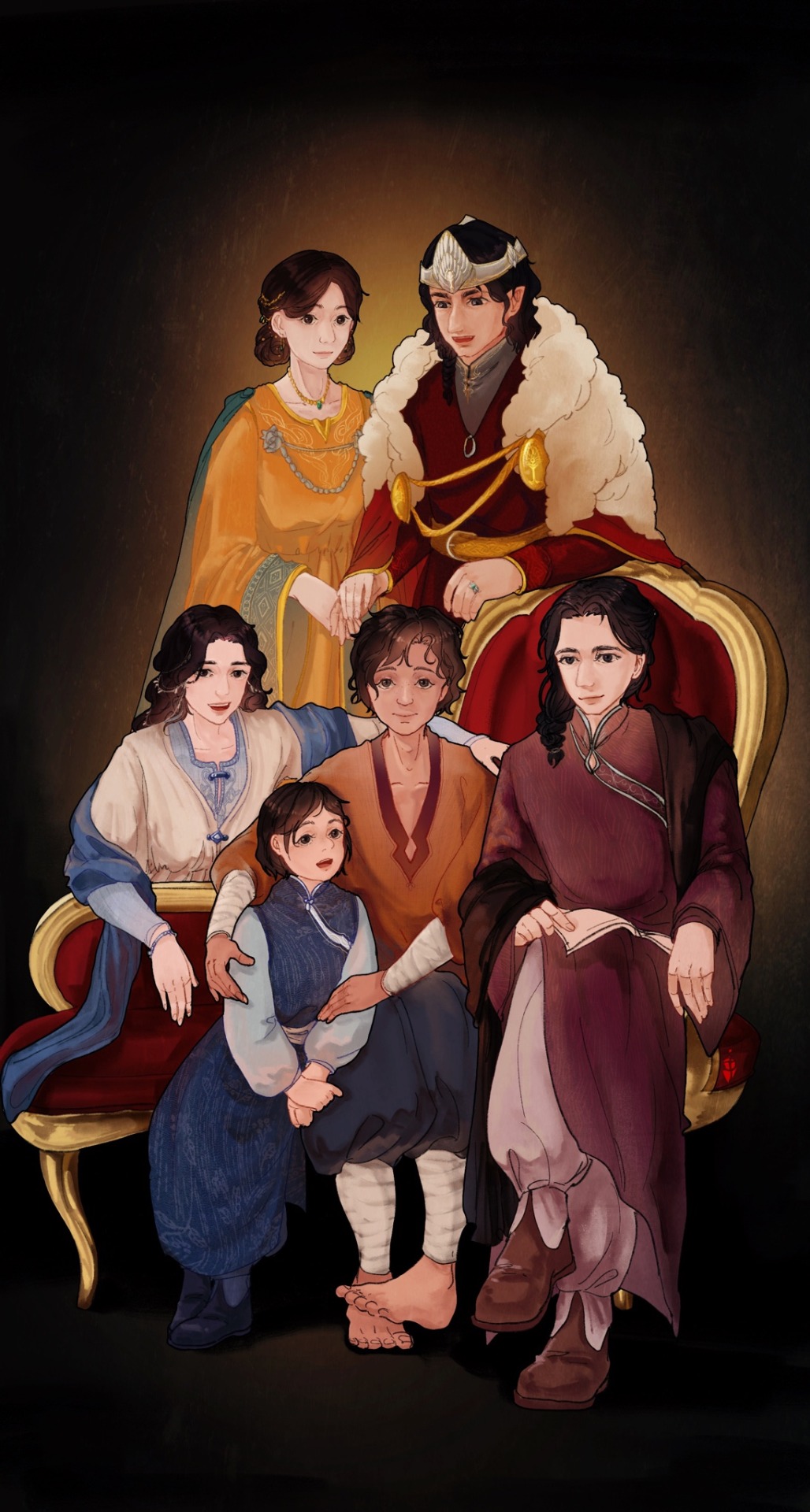
Family of Elros 👑
325 notes
·
View notes
Text
Fourth Age headcanons (part 1/?):
Aragorn and Arwen's children: Eldarion, Tindómiel and Tinwërínel, Eldalótë
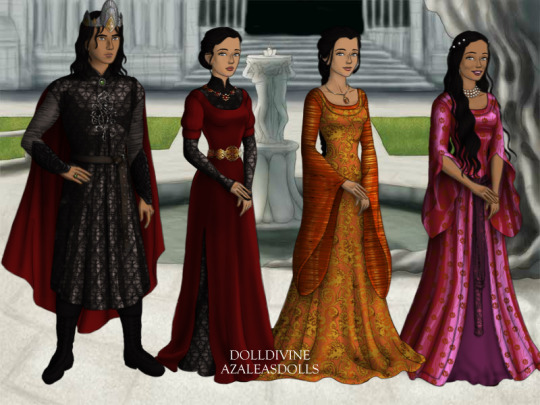
About the picture: Eldarion is wearing the ring of Barahir as well as the Elessar. Tindómiel favours dark colours, especially the royal colours of Gondor, and a few pieces of jewellery. Tiwërínel prefers a lighter and brighter palette for her clothes, and most of her wardrobe is inspired by Elvish fashion. Eldalótë wears bright colours and Elvish cut gowns, and she prefers pearl jewelery.
Eldarion always looks grave and thoughtful (he’s got his dad’s resting bitch face) but is actually very kind and optimistic. He makes for a good king in times of peace, close to his people and always ready to improve their life conditions. One of his chief missions is to expand the school system his mother established even to the most remote parts of the kingdom and founding affordable universities, the most famed being led by his sister. He is very fond of the sea, and spends as much of his time as he can in the coastal regions of his kingdom. He meets his wife, Medliniel, in Dol-Amroth, and they have a daughter, Míriel, who succeeds him on the throne.
Tindómiel and Tinwërínel are twins, born four years after Eldarion.
Tindómiel is stern and studious, preferring the company of old books to people. She is fiercely protective of her family and, much to the amusement of her parents inherited many of Elrond's mannerisms, notably his Disappointed GlareTM. Famed lore mistress, Tindómiel is the Lady of Isengard and dedicates her life to cataloguing and archiving all the things Saruman and his predecessors left in the tower of Orthanc, turning it in a high place of knowledge and studies in the Reunited Kingdom. She remains unwed but considers all the women of Gondor, Arnor, Rohan and beyond she taught as her daughters. She names one of her great-nieces as her heiress, declaring that the fiefdom of Isengard should always be ruled by a woman since men brought only ruin there. The Ladies of Isengard become known across all of Middle-Earth for their wisdom and knowledge.
Tinwërínel is as extroverted as her twin is introverted and she thrives in the political landscape of the Reunited Kingdom. Clever politician and ruthless diplomat, or vice versa depending of the situation, she is one of her father's most trusted advisors and he names her Stewardess of Arnor. Tinwërínel has to abdicate the function when she marries Elboron and becomes Princess of Ithilien, but she remains an active politician even as she raises three sons, and is part of her brother's council. She remains widowed at the age of 110 and returns to Annúminas where she is Chief Advisor of the Steward of Arnor until her death, several decades later.
Eldalótë, born seven years after the twins, is the splitting image of her mother, with her father’s love for wild places and his gift for healing. She is more than happy to be the youngest of the family, as it allows her to travel and explore without any care for politics. When in Gondor, Eldalótë spends most of her time studying the arts of healing, be it in Minas Tirith or beside Éowyn. It is during one of her stays in Ithilien that she meets Elfwine of Rohan, and they quickly start a secret courtship. They wed the year after she comes of age, making her queen of Rohan much to her dismay and her family’s amusement. Despite her initial reluctance, Eldalótë settles well enough in her role and dedicates much of her rule to building Houses of Healing in Edoras. She outlives her husband and, once their son is secure in his rule, Eldalótë leaves Rohan and divides her time between Minas Tirith, Orthanc and Annúminas. She is remembered in Rohan for her great kindess and constant cheerfulness.
About Eldarion's daughter under the cut:
King Eldarion of the House Telcontar, second king of the Reunited Kingdom, his wife Medliniel and their only daughter Míriel
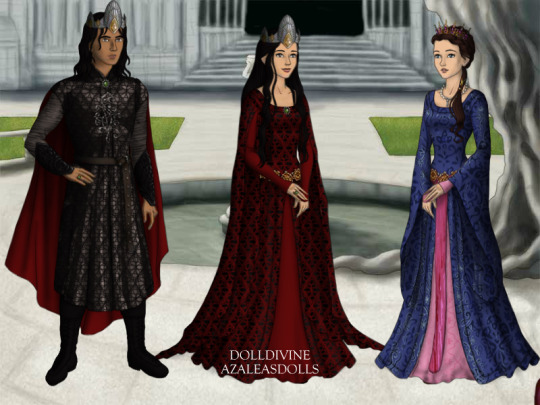
About the picture: Eldarion didn't change his style much as he appears here in his regalia. Míriel is wearing her formal court attire, icluding the ring of Barahir and the Elessar. The cut of her sleeves is a nod to her Elven ancestry while imitating a cape at the same time, which gives her more freedom of movement than wearing an actual cape. Medliniel comes from lesser nobility and she is more comfortable wearing simpler clothes (compared to her husband and daughter) and favours blue, the colour od Dol Amroth, over red and black.
CW mentions of miscarriage
Eldarion meets Medliniel in Dol-Amroth and it is love at first sight for the both of them. They wed after the shortest courtship and engagement possible without seeming entirely inappropriate and are expecting a child within the year. Unfortunately, Medliniel looses the baby and it takes them a long time before trying again. Medliniel miscarries twice more before finally giving birth to a healthy little girl they name Míriel. Eldarion and Medliniel commonly agree not to try for more children because another pregnancy could be fatal to her. They cherish their daughter and make sure she gets the best possible education as a future queen.
Míriel spends most of her childhood with her parents doting on her, but she also makes long stays by her various aunts and cousins to perfection her education. She studies history and ancient lore in Orthanc under the strict instruction of Tindómiel, rides wildly across Rohan with Eldalótë and learns the subtlety of both ruling and motherhood by her aunt Tinwërinel’s side. Strong minded and free hearted, Míriel has three children without ever marrying, though she openly lives with her lover and make no secret he is the father of her children.
When she becomes the first Ruling Queen of the Reunited Kingdom, Míriel continues many of the social refoms started by her father and grandfather. Her greatest accomplishent is to see Osgiliath fully restored to its former glory and, by the end of her reign, she even moves the capital from Minas Tirith back to Osgiliath. Her reign is highly controversed by the nobility but she is well loved by her people, especially the women. In fact, Míriel leads a great reform of the laws revolving around family, marriage and inheritance, and made sure women had equal rights over their children with their husband. She also funded a network of shelters for abused women and children.
And I'll stop here before turning this massive post into a fully fleshed fanfiction.
Next post of this series will be about Tinwërínel and Eldalótë's lives and their children.
#Tindomiel is ace and lesbian she and doesn't like men very much as a rule#she took a look at the mess left in Orthanc by Saruman and whoever lived there before him and went “nah thanks I'll take over from now on”#also the doll maker is back baby! i went crazy with it and i’m not done.#tolkien#the lord of the rings#fourth age#aragorn#arwen#eldarion#headcanons#original characters#fourth age headcanons series
30 notes
·
View notes
Text
Of the Golden Horde
An Account of the Daughters of Finrod and Amarië, Their Names and Temperaments. For @finweanladiesweek a couple hours late for Day 4 - Later Generations. I definitely mis-conjugated and mis-translated everything; please don’t judge.
[polished version on AO3!]
1. Nolórwë (Q) / Nolorben (S) - (one who is) wise heart (for Andreth Saelind, “wise heart”)
Nolórwë is firstborn, and it is said that when her father first held her, he said thoughtfully—after a considerable amount of cooing and beaming—“Now that I’m meeting her properly, ‘Ingoldë’ doesn’t seem quite right…but I still find myself loathe to break all tradition…”
“Isn’t it my traditional right to name her Ingoldë?” Amarië asked from her bed.
“I thought you wanted to do the fin name,” said Finrod, sitting beside her with their babe in his arms.
“I do want to do the fin name,” Amarië admitted. “What’s the point of marrying into the House of Finwë if I don’t get to give at least my firstborn child a politically loaded name about their hair?” She reached over and ran an admiring hand over their brand-new daughter’s soft head. “Look at it…feel it… It’s like corn silk.”
After some more cooing, mutual congratulation, and contemplating and complaining that Nerdanel has ruined naming one’s child “prettiest baby” for everyone, their discussion returned to the matter of names for the wise.
“Ingoldiel,” Finrod ideated as the yet-unnamed headbutted her mother’s breast with vague concept that it was important. “Nolalissë, Noleth… Nolnor, Nolonárë, Nolonárwen…”
“Would you like,” Amarië said, with the mix of gentleness and wry amusement known best to loving wives, “to simply name her Nolórwë and invite her to remember Andreth Saelind with you, instead of pretending to be subtle about it?”
Finrod looked to her with great affection, for well she knew his heart.
Nolorwë, named Findaranel by her mother (Finwë/hair princess; S: Finriel), grew up to be an eminent scholar among the Noldor and Vanyar, and took no small part in the Great Debates of the Third Age. Among her family and friends, however. she is best known for:
Being right about 99% of the time about absolutely everything (positive (sometimes begrudgingly))
Knowing it (negative)
Being the only person who could consistently command the silence, attention, and at least potential obedience of all her younger sisters with one absolutely ear-piercing whistle. (An eldest sister of 5-7, often traveling and even more often left to babysit, must develop what techniques she can)
2. Mínakánis (Q) / Mingoneth (S) - eager-to-go/start chieftain (f) (for Barahir, “fiery/eager lord/master”)
“Oh! She’s a biter!” Finrod is said to have said in delight of his second daughter.
“I hope not too much!” Amarië laughed and held out her hands. “Give her back, she’s hungry.”
“Mínakánis you shall be,” Finrod informed his eager daughter, as he reluctantly but dutifully returned her to her mother’s arms. He tickled her toes until they curled up. “Would you leap into a swamp to save a foolish lord from a bunch of nasty orcs? Yes you would! I think you would!”
Had Mínakánis been born seven hundred years earlier, she would’ve stood in the Great Square of Tirion at the start of a seemingly endless night and thought with two and a half of her uncles that Fëanáro was an ass and possibly mad as well, but he did have a point about the attraction of strange new lands to explore, to be free in, to conquer and defend with deeds of legend. She would have crossed the Ice and likely died in the Dagor Bragollach.
Fortunately, though to her sometimes-frustration, she was born in the early Second Age. Of her parents’ lives of itinerant diplomacy, itinerant appealed to her and diplomacy did not; from an early age she was skilled at sneaking out of parties to get muddy, climb trees, and generally frustrate her older sister to no end. Later, she toyed with the Hunt of Oromë, the Races of Nessa, the Trials of Tulkas… The last suited her best, though still she felt stifled at times. She was more skilled with a sword than many veterans of Beleriand. She just wanted to be useful with it.
For many centuries, Mínakánis split her time between the training yards and the life of a sailor, soon captain among her Telerin cousins. She traded with Númenor until it was forbidden on both sides, and then she smuggled for many more years. She flirted with Ossë in his fiercest tempers.
She was happiest of all when the world Changed and Valinor’s new, tangential location set it more on the barrier between Without and Within—giving its people a duty, should they accept it, of guarding the latter from the former. The Greatest Evil is kept out by the guard of the Valar, but there are pettier dark and dangerous things that gnaw at the edges of the world, sometimes from both sides. Most who live in Valinor these days live in the untroubled peace they were once promised, but others pace the borders on guard under the leadership of the Warrior, or ride out with the Hunt when on rare occasion the Tulkandil need backup. Love not the bright sword for its sharpness, nor the arrow for its swiftness, nor the warrior for their glory; but only that which they defend, say the wise - but there are some who can love both. Mínakánis is one such a warrior - and she still does sail, don’t get me wrong. She just fights a lot more sea monsters.
3. Maranwetar (Q) / Manatar (S) - queen of destiny (for Turin "Turambar", "master of fate")
“Pityalaurë, the playpen is not going to move or open,” Amarië called across the open kitchen. “Perhaps you could just play with your blocks until dinner is ready?”
Her third daughter stood back up on her wobbly, 18-month-old legs; glared at Amarië through the playpen’s sheer-cloth wall, and charged the wall again with the determination of a bull. And fell down again.
“Have you still not named her?” asked Finduilas, sipping wine and stirring soup while Amarië basted the chicken.
“At this rate, I think we’re going to call her ‘Pityalaurë,” Elenwë teased, sipping wine at the table and stirring nothing at all. “It’s His Majesty who’s still dithering.”
Amarië flicked a gibbet at her good-naturedly.
“Finrod keeps hoping to recognize someone in her,” she explained to her great-niece. “Not that he needs to, to love her - you’ve seen how all these girls have him wrapped around their fingers! But now that he’s named two for remembrance, he so wants to keep it up - but ‘it needs to be right,’ you know.” She quoted wryly.
She watched her daughter get to her feet again, stare in determination at the playpen wall, duck her head, and backup a couple feet, kicking aside soft blocks, in order to get a better running head start.
She didn’t seem to be having fun, per se, but she also wasn’t crying or even bored. On her third child, and with dinner to get ready before her husband and the older girls got back from their hike, Amarië knew that this was a solid win.
Pityalaurë rebounded and fell down again. It was a very sturdy playpen. She got up once more, visibly more determined than ever.
Finduilas watched with an odd expression on her face.
“Have you considered ‘Thurineth’?” she asked. “That is, ‘Folissë’...or maybe Edainelwen...”
Manatar was, of course, eventually named for one of Túrin’s more impressive titles, albeit with an optimistic twist. Don’t let the Finwëan ancestry fool you: she gets that stone-wall stubbornness directly from her mother.
(A brief aside on Amarië of the Vanyar: when word came of Findaráto’s death, Amarië’s mother waited a few polite days and then said gently, “Maybe this is for the best, really... You can move on. To someone less...Doomed.” The next night, Amarië arrived at the royal palace in Tirion with a suitcase, asked dry-eyed if she could stay, and more or less appointed herself Arafinwë’s assistant secretary, and later aide-de-camp. Finrod - firmly calling himself ‘Finrod - was re-embodied before the War, but not allowed to join the Host; they eloped a few hours before she sailed east. She reconciled with her parents when she got home 50-odd years later.)
Manatar was the first of the “Golden Horde” to give her parents a grandchild. First a wild possum when she was thirteen years old (the elf equivalent of about six), and later an actual elven child. Which she did not find in the woods. Really.
I’m not sure where she and her wife settled down - it was in a community that doesn’t exist yet in the First Age or earlier, I think. Somewhere with a lot of Returned and/or Sailed Sindar, maybe (thus she uses a Sindarin name). Wherever it is, there’s some sort of farm, and it’s where all her far-flung sisters come home to for the holidays.
4. Mothername: Tindómiel (Q) / Tinúviel (S) - nightingale (lit: daughter of twilight)
Fathername: Veryawendë (Q) / Berenwen (S) - bold maiden
It is said that when they first beheld their fourth daughter together, wrinkled of face and dark blond of hair, Finrod was struck by recognition of temperament and by vague but certain foresight of great deeds, and said immediately, “Berenwen”; and Amarië was struck for the first time by true mother’s foresight, a vision of Song in a dark place and irrevocable change in the world, and she said at the same time, “Tinúviel.”
They looked at each other. They looked down at their daughter in Amarië’s arms, wrinkled of face and dark blond of hair. They looked at each other again.
“Oh wow,” said Amarië. “She’s going to fuck up so much. In a good way, I hope.”
“Are you okay?” Finrod asked, now struck suddenly by the founding anxiety of the House of Finwë. “I mean, are you feeling well? You’re not– That was a longer labor than usual, but you’re a normal amount of tired from it, right? Proportionately? You didn’t - I didn’t pour any more energy into this child than the others, and I didn’t notice you - ”
“I’m not disproportionately weary and I’m not going anywhere, Ingoldo,” Amarië promised, and leaned up to kiss him gently on the forehead. Then she leaned down to press an even softer kiss to Tinúviel’s soft fuzz. “Not without you and all our girls, not ever.”
It is not known at the time of this writing what Tinúviel Berenwen will do to irrevocably change the world. She was not involved in the Fall of Númenor. She did not participate much in the Great Debates of the Third Age - not the posting of the Ninety-Five Theses, not the Diet of Valimar, not the Excommunication of Melian and all that followed. (She did take part in a few experimental Oaths, but she had nothing to do with the Return of the House of Fëanor - not that anyone but Findis really did). She did not even sneak off to Middle Earth to participate in the Quest of the Ring, though she did think about it.
She did quite a lot of jewelcraft, actually, though she tended to avoid working with captured light. She specialized in single-gem statues carved such that the light reflected off and within them made them seem to move. She also Sang, and this, she managed to find her own voice in, though she still preferred not to do it in public.
(It occurs to me that Tinúviel Tindómiel and Celebrimbor get along fantastically once he re-embodies in the early Third Age).
Personally, my money is on Tindómiel being the one to figure out how the Eldar can physically leave Arda, probably in ships that sail the Void. But that would require me to figure out the metaphysics of outer space in Éa, and I’m not doing that right now. I do not, for the record, think they could stop being tied to Arda. I just think maybe they could get away for a while.
(There’s nothing like being named “Tinúviel Berenwen” to make you desperate to escape absolutely everything and everyone you grew up with, and all their expectations.)
5. Satarissë (Q) / Sadeth (S) - trusty follower/loyal companion [feminine] (for Beor, "vassal")
It is said that when Finrod Felagund, Friend of Men, first held and fully beheld his fifth daughter with the insight for which he was known, he spoke with joy and satisfaction and a little relief: “There you are, old friend.”
Satarissë’s sisters have complained that she’s Dad’s favorite because she reminds him of his favorite Man. This is almost certainly untrue. Satarissë’s sisters have complained that she’s Dad’s favorite, and everyone else’s to boot, because she’s the baby of the family (for several millennia). This is probably true.
Like her namesake, Satarissë was a loyal friend, a daring leader, and more politically savvy than most people give her credit for - until they learned better. She was everyone’s favorite charming, golden, sweetest babiest princess. She learned from Great-Aunt Lalwen (though Lalwen was as much the Hostess (and Spymaster) of Barad Eithel as she was the Royal Gem of Tirion, now; somehow they averaged out to Lady of Tol Eressëa). She learned from her parents, especially Finrod - and the reason all these kids grew up as the children of itinerant diplomats is that...
At the end of the War of Wrath, when the Host of the West returned to the ever-Amanyar and the Doomed began to return by ship and re-embodiment, and more and more elves began to sail to the promised land... Between his initial repentance and his leadership and valor in the War, Arafinwë was generally respected among all factions. Eärwen had spent most of the War standing on decks, docks, and the very edges of shore and smoothing the way between Teleri and Noldor, Vanyar and Falathrim, Maiar and Avari and Edain, and she, too, was well-regarded. Lalwen knew everyone who was anyone in Beleriand and everyone who was still alive by the end, and they knew her. And there were others among all the peoples of the Quendi who are commonly respected, liked, and skilled enough at diplomacy to make up for the fact that nobody else was, in this suddenly created melting pot of PTSD and unresolved grudges.
But only one person was a blessedly returned crown prince of the Noldor-who-stayed and a respected, often beloved former king of the Noldor-who-left and a lord by grandparentage and marriage of the Vanyar and a returned-and-forgiven prince of the Teleri and a well-known, esteemed friend and ally of every faction of the Beleriandrim, and by nature and honed talent a maker of strange friends, weaver of alliances, and welcomer of weary, perhaps morally dubious refugees...and that was Finrod. So, yeah, they did a lot of traveling, mostly to put out metaphorical and sometimes literal fires - and because it was fun. Traveling is almost always fun, especially with an ever-increasing horde (hoard) of cheerfully energetic, all very blond children.
...the sweetest, babiest, everything-to-everyone-est of whom is Satarissë! And she has a lot to live up to - her oldest sister was a respected loremaster by the age of 200, her second-oldest was beloved of the Warrior, third was Maranwetar whom everyone liked without any effort on her part, fourth was freaking Tinúviel, who was soon a master crafter to boot - and her mother had been part of the final party to confront Morgoth, for fuck’s sake! While all Satarissë was good at was charm and politics, and on a good day, rhetoric. So she ruthlessly leveraged being beloved Finrod’s most beloved daughter into...whatever seemed like a good idea at the time, mostly. Getting a vast bridge built between two mountain cities. Settling newly re-embodied Avari into new homes without disrupting their new neighbors. Studying and testing various forms of government on a small scale until she was ready to convince everyone to create a parliament of the Noldor to better represent the interests of the later-born - and when that started to fall apart in a millennia or so, a multi-branch governmental structure; and 800 years after that...
Even into the Fourth Age, Tirion-upon-Túna remains the center of Elvish government in Valinor, or at least the hotspot for (those who enjoy) political infighting, so Satarissë spends 60% of her time there - but the remaining 40% keeping up the family tradition of itinerant diplomacy. She is the only person who has ever successfully challenged Fingolfin for political rule of the Noldor. She is the only person who’s ever come close to winning the High Kingship from Arafinwë on grounds of genuine campaigning, rather than “this person invented an awesome thing; lets let them lead ceremonies for a century.” Arafinwë was briefly ecstatically hopeful, not to mention grandpaternally proud, until he beat her in a mild landslide the following election. (Quoth Lalwen: “Sorry, Ara, but Satyë wants it too much. No one sensible trusts her to manage if something went horrifically wrong.”)
One of Arafinwë’s significant contributions to ongoing peace in Tirion and all of Eldamar is that he periodically locks his brother and his granddaughter in a room together with a variety of competitive board games, card decks, and about a week’s worth of food and water. Starting a few centuries into the Fourth Age, he locks Maedhros in with them as well. This is exactly why people keep electing him High King, obviously.
6-7. Ambalaura (Q) / Amgloer (S) - golden heads
Thalanis (Q) / Thaleth (S) - dauntless, steadfast, heroic woman (for Húrin Thalion)
Thandanis (Q) / Thandeth (S) - shield woman (for Huor, no less steadfast, no less great in guarding that terrible retreat)
Elenwë returned from Mandos just after the Exile was lifted. She left her husband behind, and many friends, but many friends were waiting in the land of the living, and her daughter. She spent much of the next several millennia on Tol Eressëa with Idril (who happily handled much of the practical management, while Lalwen kept people from killing each other), and when she wasn’t there, she was often touring with Finrod and Amarië. They were only too happy to have her, being best friends of old, and always needing an extra pair of hands to manage the Golden Horde (of which Idril was 100% honorarily part).
Eventually Turgon caught up with them, however, late in the Second Age...and with the dawn of the Third Age, the four of them finally got around to carrying out the plan they’d hatched back when they were all young together in the Light of Trees: friendship-inducing simultaneous pregnancies and births, just like Finrod and Turgon’s parents did! Twice the babies, twice the fun!
Now, the people of Valinor, very much including the Noldor, know a reprise when they’re watching one unfold, even if it’s an ironically happy one. (They’re much more used to echoed tragedy.) So multiple people warned Amarië, while she was pregnant with her sixth child, “You’d better not be having twins. I swear to Vana, you’d better not be having twins.”
“It’s very rude how everyone thinks I’d upstage you like that,” Amarië would complain later to Elenwë. “Anyway, we’re having twins jointly, aren’t we?”
They were. They really were. The Vanyar had a small population when they left Cuviënen and, while they grew, they never grew as much as the Noldor, Teleri, or anyone else; certainly when Amarië and Elenwë were born, everyone was still related to everyone else. Those two specifically are second cousins once removed - so the babies both came out with bright golden hair, blue-grey Finwëan eyes, the nose of Amarië’s great-grandmother who was Elenwë’s great-aunt...
Their births were staggered by a few weeks, just as Finrod & Turgon’s and later Galadriel & Aredhel’s had been, in case something went wrong and recovery time was needed. But from the first shared days of their shared lives, the Ambalaura were inseparable - each never happier than when the other was near; each rarely happy when the other was not. Per tradition firmly established, they were father-named after Turgon’s friends now lost to the Gift of Men, themselves brothers - and as soon as they had will and wit to be clever, both girls dedicated themselves, with great sense of mischief, to making sure nobody could remember who was which. Or at least, who came from which parents. They dressed alike. They spoke alike. They slept in each other’s beds, sometimes together, sometimes swapping houses.
They were joyful. They roamed the countryside freely and laughed even more freely - even though the countryside was a little more dangerous than it used to be, with the Changing of the World. So they took up spears at need, though only ever on the edges of the Hunt - they had little true wildness in their hearts, just a lack of fear so long as they fought back to back.
All their older sisters were long-since grown, most like aunts than sisters. Manatar had children of her own, also grown. Satarissë was getting locked in a room with Great-Uncle Fingolfin and a Monopoly board again (a game from lost Thargelion). In Valimar, Nolorë debated with friends over honey wine about the ethics of the Sinking of Númenor and what, if anything, ought be done about it.
But everyone still knew a reprise when they saw it. So they called the twins, daughters of both Finrod and Amarië and Turgon and Elenwë, Ambalaura; and Nerdanel added statues of them arm in arm to the royal garden (to which she added statues every time the House of Finwë got a new member). And there was peace, and great friends remembered with joy, in Valinor.
#my fic#the silmarillion#finweanladiesweek#finrod#amarie#ficlet#i really should've known how many words this would take to write#and yet i lived in denial#god it's inconvenient that i had to be at work in 7 hours#you may note that the og five man band is nolorwe - leader; satarisse - lancer; minakanis - big guy#tindomiel - smart guy; manatar - heart#with Idril as sixth ranger and later ambalura as babies#ambalaura are literally never ever going to stop being the babies of the family; it’s their doom
67 notes
·
View notes
Text
i am. once again thinking about luthien-elwing-arwen&tindomiel parallels/connections and i am going Feral
#none words much feelings very AAAA#AAAAAAAAAAA#[not attempting to do a finrod impression but that's the only way i can express the emotions rn]#luthien tinuviel#elwing my beloved#arwen undomiel the love of my life#tindomiel
6 notes
·
View notes
Link
Chapters: 1/1
Fandom: The Silmarillion and other histories of Middle-Earth - J. R. R. Tolkien
Rating: General Audiences
Warnings: No Archive Warnings Apply
Characters: Elros Tar-Minyatur, Tindómiel (Tolkien)
Additional Tags: brief appearance by Sauron, The Wave dream, Remix
Summary:
Elros dreams of water. His daughter does too.
~~~
My other @tolkienremix fic, also for @aipilosse! This time a remix of Darkness Inescapable, a wonderful fic with Elrond and the Wave Dream that I highly recommend. I wrote a prequel where, instead of Elrond, it was his brother and his niece that dreamt of the Akallabêth.
I’d also like to mention Tolkien’s untitled and heartwrenching poem (in Qenya with line translation), from which I took the title. Well worth a read.
31 notes
·
View notes
Text
crying about earendil again!!!
#HES JUST A GUY!!!#HES OUT THERE EVERY NIGHT AND PEOPLE SAY HELLO!!!!#EVEN IF THEY DONT BELIEVE THAT HES REAL THEY STILL GO THROUGH THE LITTLE RITUAL OF CALLING OUT TO HIM#BOTH OF HIS GRANDDAUGHTERS ARE NAMED AFTER HIM#DO YOU EVER THINK ABOUT HOW ELROS AND ELROND'S DAUGHTERS HAVE MATCHING NAMES???#TINDOMIEL AND UNDOMIEL!! THE MORNING AND EVENING STAR#AND THATS THE SAME STAR AND THAT STAR IS THEIR GRANDPA
7 notes
·
View notes
Text
Thoughts on Maglor and Elrond's kids. (Also a little Maedhros)
You know, the thing that makes me sad about Maglor never meeting Arwen is that he never gets the chance to confuse her for Elwing, who probably looked a fuck ton like Luthien herself.
I feel like that would be so emotional. Maglor meeting Elwing's granddaughter, who embraces him warmly in complete opposition to her grandmother, who ran away the moment she met him.
And although it been discussed before, if Elladan & Elrohir look like their dad in your interpretation, Maglor would absolutely go through the seven stages of grief seeing two half-elf twins who look exactly like the ones he loved and raised like they were his own
BUT I subscribe to the idea of Elladan & Elrohir looking like Dior's twins, taking after their silver-haired descendent of Elmo mother
because, can you actually imagine what it would do to Maedhros seeing grown up Elured & Elurin look-alikes.
#at least I headcanon Tindomiel became an elf so Maglor can still confuse a granddaughter of Elwing for Elwing#maglor#arwen#elwing#elladan#elrohir#elrond#maedhros#the silmarillion
82 notes
·
View notes